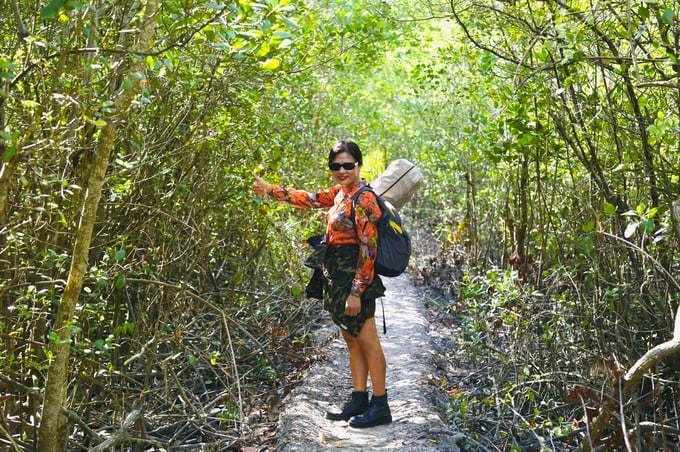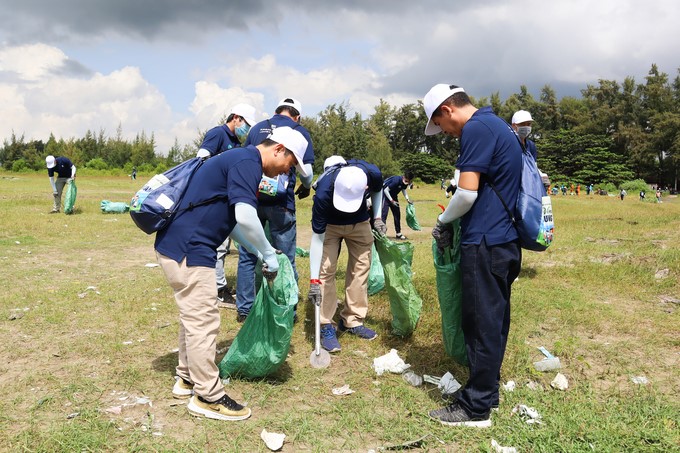November 27, 2025 | 04:08 GMT +7
November 27, 2025 | 04:08 GMT +7
Hotline: 0913.378.918
November 27, 2025 | 04:08 GMT +7
Hotline: 0913.378.918

Adventure tourism at Can Gio mangrove forest. Photo: T.L.
Applying ESG (Environmental – Social – Governmance) factors to the tourism development strategy will help Vietnam better exploit its tourism potential. At the same time, protect and sustainably develop natural resources and cultural heritage.
This is one of the contents shared at the workshop "Orientations to Promote Sustainable Tourism Development through ESG," organized by the Ho Chi Minh City Department of Tourism, within the framework of the 18th International Travel Expo Ho Chi Minh City 2024.
Ms. Bui Thi Ngoc Hieu, Deputy Director of the Ho Chi Minh City Department of Tourism, said that in parallel with rapid development, the tourism industry is also facing major environmental and social challenges. Especially after the COVID-19 pandemic, tourists' consumer sentiment and behavior pay more attention to environmental and social criteria in choosing destinations.
Vietnam's tourism development strategy to 2030 also identified to develop tourism with a sustainable and inclusive orientation on the foundation of green growth and maximizing the contribution of tourism to sustainable development goals.
In the journey towards sustainable and comprehensive development, integrating risk management principles and frameworks such as ESG into strategies and goals is considered a "door" for the development of the tourism industry in the future.
In particular, with the trend of international tourism increasingly focusing on environmental and social criteria in choosing destinations, the implementation of ESG commitments by Vietnamese tourism organizations and businesses will help enhance competitiveness, attract tourists, and contribute to sustainable tourism development at the destination.
"Through applying ESG principles in tourism, businesses can minimize negative impacts on the environment and community. At the same time, create positive social values such as enhancing the lives of local communities, protecting cultural and natural heritage, and improving the quality of life for local people," emphasized Mr. Nguyen Hoang Nam, Deputy General Director and Leader of ESG PWC Vietnam.

Many businesses have many activities towards sustainable development through ESG criteria. Photo: Gaia.
Ms. Nguyen Ha Dung, Deputy General Director of Oxalis, said that applying the Environmental criteria of ESG will help minimize negative impacts on the environment through reducing emissions, protecting natural resources, and encouraging the use of renewable energy.
Mr. Inthy Deuansavanh, Founder & CEO of Inthira Group, Laos, affirmed that applying Social criteria of ESG will help contribute to the development of local communities through creating jobs and preserving cultural and traditional values, while improving service quality for tourists.
Mr. Dam Van Tuan, Deputy General Director and Member of the Board of Directors of ACB Bank, said that the application of ESG's Governance criteria helps increase transparency and make corporate governance more effective, ensuring business decisions are not only based on short-term benefits but also aim for long-term sustainability.
Currently, most of the world's major travel agencies require ESG practices at their suppliers/tour operators abroad to maintain and develop partnerships. Good ESG practices will be solid luggage and a good marketing tool for businesses in approaching individual tourists and group or corporate tourists.
Experts assume that businesses can start practicing ESG with good governance, which will prevent legal risks, enhance business efficiency, save costs, and optimize profits. Each business can set its own action goals without any external influence.
Next, practice environmental factors based on the company's activities to evaluate and inventory greenhouse gases, waste discharge, and waste so that the business can set its own improvement goals.
Finally, practice community factors, depending on the scope of business and the impact of the business on the community, so that the business can make its own goals and solutions.
Ms. Nguyen Thi Bich Ngoc, Deputy Minister of Planning and Investment, said that in the green growth journey, ESG is a set of measurement standards to evaluate the sustainable development of businesses. Because in addition to profits, businesses must also pay attention to environmental and social factors.
Ms. Nguyen Thi Bich Ngoc, Deputy Minister of Planning and Investment, said that in the green growth journey, ESG is a set of measurement standards to evaluate the sustainable development of businesses. Because in addition to profits, businesses must also pay attention to environmental and social factors.
This set of ESG standards is quite new to the Vietnamese business community. Green energy, green production, and green growth are important factors in increasing the ESG index to help businesses develop and increase competitiveness in the export sector. Around the world, applying ESG is a trend among businesses.
Large businesses are now realizing that promoting and complying with ESG not only helps them develop sustainably but also creates long-term benefits for shareholders and the community. Thus, more and more businesses have been and are continuing to make efforts to reduce carbon emissions and waste, using socially responsible inputs, to meet the ESG criteria that are becoming increasingly important in the eyes of investors and consumers.
Translated by Thu Huyen
/2025/11/26/4909-2-154329_878.jpg)
(VAN) Pearl grouper farming in HDPE cages not only delivers economic efficiency but also contributes to protecting the environment, creating jobs, and promoting marine-based experiential tourism.

(VAN) The model of making a living under the forest canopy through the agroforestry system in Van Son commune, Bac Ninh province, is expected to generate an annual income of approximately VND 30 million/ha.

(VAN) Many enterprises in Can Tho are harnessing natural energy and reducing greenhouse gas emissions in their production processes, thereby contributing to the promotion of a sustainable green transition.
/2025/11/24/3536-2-112800_176.jpg)
(VAN) Dong Nai now has tens of thousands of hectares of forests certified for sustainable management, and this area will continue to be expanded in the coming period.

(VAN) Vinh Ha hamlet (Dai Xuyen commune, Hanoi) is shifting away from small-scale farming as households adopt bioscurity into their breeder chicken models.

(VAN) Heavy rains make aquatic species more vulnerable to disease. Proactive water management and high-tech systems help farmers prevent outbreaks and protect yields.

(VAN) Greenhouses are shifting production mindsets in Binh Lu commune, enabling farmers to ‘weather the sun and rain’ and secure stable vegetable harvests throughout the year.